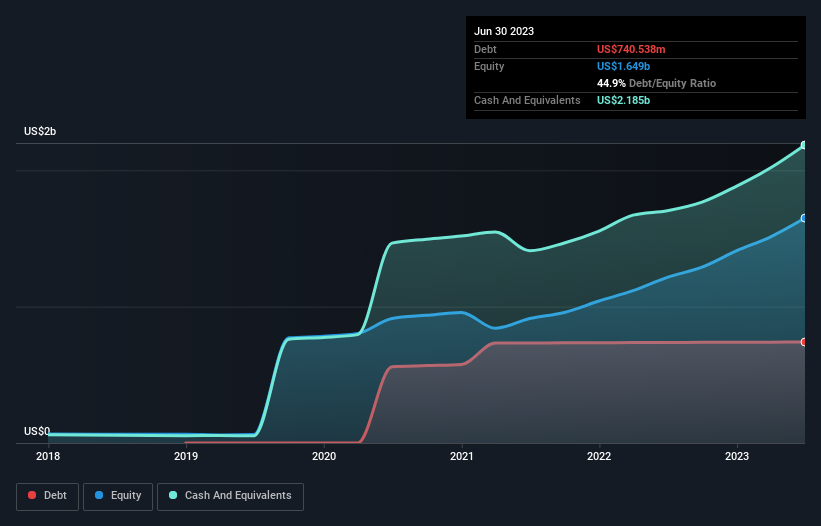
Warren Buffett famously said, 'Volatility is far from synonymous with risk.' It's only natural to consider a company's balance sheet when you examine how risky it is, since debt is often involved when a business collapses. Importantly, Datadog, Inc. (NASDAQ:DDOG) does carry debt. But is this debt a concern to shareholders?
Why Does Debt Bring Risk?
Generally speaking, debt only becomes a real problem when a company can't easily pay it off, either by raising capital or with its own cash flow. Ultimately, if the company can't fulfill its legal obligations to repay debt, shareholders could walk away with nothing. While that is not too common, we often do see indebted companies permanently diluting shareholders because lenders force them to raise capital at a distressed price. Having said that, the most common situation is where a company manages its debt reasonably well - and to its own advantage. The first step when considering a company's debt levels is to consider its cash and debt together.
Check out our latest analysis for Datadog
How Much Debt Does Datadog Carry?
The chart below, which you can click on for greater detail, shows that Datadog had US$740.5m in debt in June 2023; about the same as the year before. However, it does have US$2.19b in cash offsetting this, leading to net cash of US$1.44b.

A Look At Datadog's Liabilities
Zooming in on the latest balance sheet data, we can see that Datadog had liabilities of US$761.4m due within 12 months and liabilities of US$901.5m due beyond that. Offsetting this, it had US$2.19b in cash and US$333.1m in receivables that were due within 12 months. So it actually has US$855.7m more liquid assets than total liabilities.
This surplus suggests that Datadog has a conservative balance sheet, and could probably eliminate its debt without much difficulty. Succinctly put, Datadog boasts net cash, so it's fair to say it does not have a heavy debt load! The balance sheet is clearly the area to focus on when you are analysing debt. But it is future earnings, more than anything, that will determine Datadog's ability to maintain a healthy balance sheet going forward. So if you're focused on the future you can check out this free report showing analyst profit forecasts.
In the last year Datadog wasn't profitable at an EBIT level, but managed to grow its revenue by 39%, to US$1.9b. With any luck the company will be able to grow its way to profitability.
So How Risky Is Datadog?
Although Datadog had an earnings before interest and tax (EBIT) loss over the last twelve months, it generated positive free cash flow of US$422m. So although it is loss-making, it doesn't seem to have too much near-term balance sheet risk, keeping in mind the net cash. We think its revenue growth of 39% is a good sign. There's no doubt fast top line growth can cure all manner of ills, for a stock. The balance sheet is clearly the area to focus on when you are analysing debt. But ultimately, every company can contain risks that exist outside of the balance sheet. Case in point: We've spotted 2 warning signs for Datadog you should be aware of.
If, after all that, you're more interested in a fast growing company with a rock-solid balance sheet, then check out our list of net cash growth stocks without delay.
New: Manage All Your Stock Portfolios in One Place
We've created the ultimate portfolio companion for stock investors, and it's free.
• Connect an unlimited number of Portfolios and see your total in one currency
• Be alerted to new Warning Signs or Risks via email or mobile
• Track the Fair Value of your stocks
Have feedback on this article? Concerned about the content? Get in touch with us directly. Alternatively, email editorial-team (at) simplywallst.com.
This article by Simply Wall St is general in nature. We provide commentary based on historical data and analyst forecasts only using an unbiased methodology and our articles are not intended to be financial advice. It does not constitute a recommendation to buy or sell any stock, and does not take account of your objectives, or your financial situation. We aim to bring you long-term focused analysis driven by fundamental data. Note that our analysis may not factor in the latest price-sensitive company announcements or qualitative material. Simply Wall St has no position in any stocks mentioned.
About NasdaqGS:DDOG
Datadog
Operates an observability and security platform for cloud applications in the United States and internationally.
High growth potential with excellent balance sheet.
Similar Companies
Market Insights
Community Narratives



